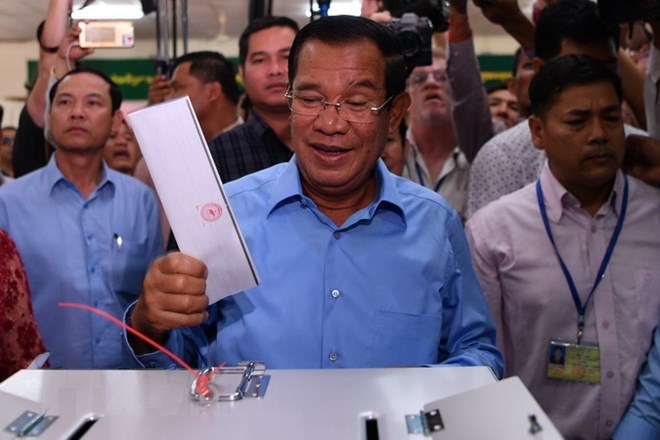
Cambodia’s National Election Committee on the evening of August 15 announced that the Cambodian People’s Party (CPP) has won all 125 parliamentary seats in a July 29 general election.
Cambodian People’s Party
(CPP) has won all 125 parliamentary seats in a July 29 general election
(Source: AFP/VNA)
According to the committee,
6,956,900 out of 8,380,217 potential voters, or 83.02 percent of the voting
population, cast their ballots in the election.
The CPP received 4,889,113 votes, or 76.85 percent, of valid votes. The
remaining votes were shared among other 19 parties but none of them won seats
in the National Assembly.
This is the first time the CPP has swept up all seats in the parliament since
the election in 1993, thus opening up opportunities for the Party to make major
decisions and policies for the country over the next five years.
Prime Minister Samdech Techo Hun Sen said on August 8 that the sixth National
Assembly will convene on September 5 under the chair of King Norodom
Sihamoni.
The legislative body is scheduled to cast votes of confidence to establish the
sixth Government on September 6. The new Government will meet for the first
time a day later.
Source: VNA
The first summit between the European Union (EU) and the Gulf Cooperation Council (GCC) in Brussels, Belgium, marked an important step forward in their bilateral relations.
The 45th General Assembly of the ASEAN Inter-Parliamentary Assembly (AIPA-45) opened in Vientiane on October 19.
Many countries are grappling with rapidly aging population. As population aging becomes an irreversible global trend with significant impacts on economic and social sectors, nations face the urgent task of creating flexible policies to adapt to and make the most of this trend to build prosperous and sustainable societies.
With a series of stimulus measures, the world tourism industry is on the way to recovery as before the COVID-19 pandemic broke out. Facing the opportunity to take off, the "smokeless industry” is expected to strongly contribute to global economic growth while promoting potential and cohesion, contributing to peace and sustainable development.
The danger from the COVID-19 pandemic is still latent, threatening people’s health and lives in the context that the immunity provided from the COVID-19 vaccine has decreased. Many other dangerous diseases are also likely to break out when the global vaccination rate slows down, due to inequality in access to health services, vaccine hesitancy, and consequences of economic recession.
The Association of Southeast Asian Nations (ASEAN) is witnessing a rise in the sales of electric vehicles (EVs) in Vietnam, Malaysia and Indonesia, according to Maybank Investment Bank Research (Maybank IB Research).



